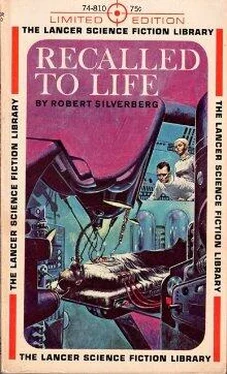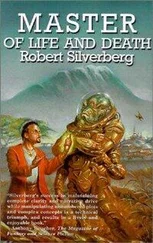“Vorys and Brewster are dead against it?”
“Absolutely. They heed the voice of the people, you see, Every minority party has to. It’s the way they became a majority again.”
Harker said doubtfully, “How’s the feeling in high Nat-Lib circles?”
Dixon shrugged. “Right now, the feeling runs toward taking the Beller labs over and continuing reanimation research under federal supervision—with you and Raymond still in charge, of course.”
“Fine!”
“Not so fast,” Dixon warned. “We’ve got a Congressional majority, but that doesn’t mean a thing. The way the people are murmuring, it looks pretty bad for getting that measure through.”
“You mean you may have to switch your stand?”
Dixon nodded. “Jim, you know all about political expediency. You tried to knock down the stone wall when you were Governor, and got nowhere. If the people say, junk reanimation, then we’ll have to junk it.”
Hotly Harker said, “Junk it? The way I was junked as Governor?”
Dixon smiled. “I’m afraid so. It’s this business of the seven idiots, Jim. That scares people more than you can imagine.”
“But we can lick that problem—eventually!”
“Maybe you can. But the voters don’t believe that. All they see is the short-range possibility. And they’re more afraid of having a loved one turn into a zombie than they are of death. After all, you can’t very well kill your wife or son or father if you’ve had him reanimated and he turns out to be an idiot. You have to go on supporting him. It’s pretty frightening.”
Doggedly Harker said, “I think we can get over that particular hump.”
“Then reanimation’s in. Jim, I’m not so foolish as to think that we can ever go back to where we were two months ago. The Beller process exists; it can’t be destroyed. But it can be batted around in committee and sidechannelled and circumvented until the time is ripe for popular acceptance. And the Party may have to do that to you, though I hope it doesn’t happen.”
“Do you think it will, though? ”
Again the sad smile. “Read the newspapers, man. Read your mail!”
Harker read his mail.
He ploughed through hundreds of vicious, sweat-provoking letters. He sorted them out: favorable on one side, unfavorable on the other. The unfavorable pile grew so high it toppled over, and he started a new one; the pile of encouraging letters was no more than three inches thick.
They were letters of raw hate, most of them. The kind of thing that went, My beloved mother/father/sister/brother/son/daughter/aunt/uncle/grandmother/grandfather/ died last week, and I want to tell you she/he had a decent Christian burial and went to his/her eternal repose. Naturally I feel sorrow at my loss, but Yd rather be dead mysetf than let a loved one of mine get into your hands. Sure, maybe you’ll bring him/her back to life — but who wants to see the hollow mindless shell of someone you once loved? Not me, brother. Not me.
It was an enlarging experience to read those letters. Even when he had held public office, Harker had never received so many, nor such loaded ones.
It was astonishing. They gloated in the triumph of death, they thanked God they had not allowed their beloved ones to be reanimated, they extended curses for Harker and his whole family. He was the target of their hate, the symbol for reanimation.
At first he was irritated, then angered; anger passed, and turned into compassion. Perhaps some of these same people had written to him a month ago, pleading to have a loved one restored to them by the new miracle of science. Now, confused by the haze of conflicting tales, of lies and partial truths, their earlier willingness turned to repulsion.
Harker wearily baled the letters up again, and left Litchfield to spend some time with his puzzled, unhappy family. They were accustomed to seeing their father’s name in the headlines; it was old stuff to them. But this public hatred was new to them, and difficult for them to understand.
It was not too late, Harker thought. The forces of confusion could be put to rout; the dominion of death could at last have boundaries staked out.
But the public faith had to be regained. Some spectacular demonstration, some act of faith that would capture their imagination and end the sway of ignorance.
But what? How?
Harker had no answer. And the answer, when it came, arrived from an unexpected quarter.
At litchfteld again, the next day, Harker was reading through a lab report, comprehending not very much of it, when a diffident knock sounded outside his door.
Probably Lurie with the papers, he thought. “Come in!”
A slim figure in ecclesiastical robes entered. Harker blinked and said, “I didn’t expect to see you here, Father Carteret.”
“Nor I. But I thought I would make the trip.”
“Sit down,” Harker urged. “What’s on your mind?”
“Jim, I asked you to come to me if you ever had any troubles. You have them now. I thought I’d stop over and find out if I could be of any help.”
Harker felt faintly irritated. He liked the priest, but he felt no desire for unasked advice. “Father, if you’ve come to tell me I ought to quit this outfit while I still have my soul, forget it.”
“The time for telling you that is past.”
Harker stared at the priest coolly. “Then why are you here?”
“To help you. I have a suggestion for you—a rather strange one. But first: let me tell you that the Church is reconsidering its stand.”
“What?”
Carteret smiled gently. “The Church moves slowly; don’t anticipate anything for the next several years. But I have it on good understanding that as soon as your technique is perfect—that is, as soon as you can restore body and mind every time—the Church will no longer withold its approval from reanimation.”
Harker chuckled. “I’d say that bet was pretty well coppered. The if there is a pretty big one.”
“I know. But a necessary one. I’m praying for your success, Jim.”
“You? But you warned me away from this thing!”
Carteret nodded. “You took the step, anyway. And perhaps I made an original error in judgement.”
“Well, that’s neither here nor there. Reanimation is going to be squashed by Congress anyway.”
“What do you mean?”
“Simply that the defect in the process has aroused such public horror that Congress is afraid to legislate in our favor.”
“And you don’t expect to overcome that defect?”
“Not immediately. Another six months, maybe—but by that time it’ll be too late.”
Carteret steepled his long thin fingers reflectively. “You tell me, then, that your real problem is a failure of public relations. If you could sell your product to the people, Congress would follow along.”
“In a word, that’s it.”
“I thought so.”
“You said you had a suggestion to make,” Harker reminded the priest.
“I did. It’s an idea for capturing the stream of public opinion. I’m anxious to see your project succeed, Jim. It may sound strange, coming from my lips, but that’s the truth. I suffered to reach this opinion.”
“And what’s your idea?”
An odd smile appeared on Carteret’s thin face. “It’s one that bears the test of time, Jim. Our Savior went meekly to the Cross, and on the third day he rose. It was an act that has captured the imaginations and hearts of men for two thousand years.”
Harker frowned. “I don’t quite see—”
He stopped. Abruptly the deeper meaning of the priest’s words was borne in on him, and he stared at Carteret aghast, wondering.
“Would you do something like that?” he asked.
Читать дальше












